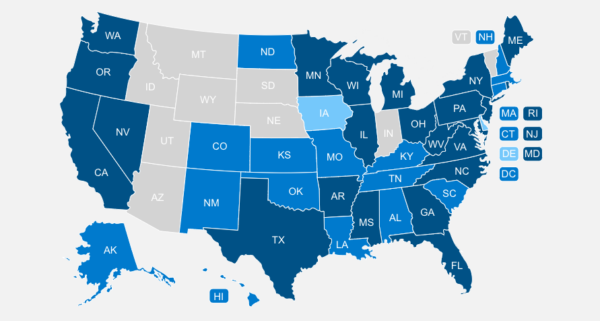
How to Start a Nonprofit in South Dakota: A Beginner’s Step-by-Step Guide
August 26, 2025
How to Start a Nonprofit in Texas: A Founder’s Step-by-Step Guide (2024)
August 26, 2025How to Start a Nonprofit in Tennessee: A Step-by-Step Legal Guide

Whether you dream of feeding the hungry, supporting the arts, or protecting the environment, starting a nonprofit in Tennessee can turn your vision into reality. However, navigating the legal requirements and paperwork can feel overwhelming at first.
That’s why we’ve created this guide to help you understand exactly how to start a nonprofit in Tennessee. From incorporating your organization to filing for 501(c)(3) status, we’ll walk you through each step of the process. Ready to make your nonprofit dreams come true? Let’s get started!
Planning Your Tennessee Nonprofit
Before launching your nonprofit in Tennessee, thorough planning sets the foundation for long-term success. You’ve outlined community needs and drafted a mission statement. Now what? Let’s tackle the state filings that move you forward.
Evaluating Your Nonprofit Idea
Initially, assess whether starting a new nonprofit is the most effective way to serve your community. Consider these essential questions:
- Does your community have a specific, unmet need?
- Are you the right person or team to address this need?
- Do you have access to people and organizations willing to support your mission with time and resources?
- Is a 501(c)(3) structure the most suitable approach for your goals?
Furthermore, Tennessee nonprofits generally fall into two categories: public benefit corporations (charities) and mutual benefit corporations (member-serving organizations) according to the Tennessee Department of Revenue guidelines. Your choice between these structures depends on whether you aim to serve the broader public or a specific membership base.
Researching Similar Organizations
Subsequently, conduct comprehensive research to understand the nonprofit landscape in Tennessee. The state features diverse nonprofit sectors, including:
- Religious organizations (6,789 organizations)
- Animal welfare groups (5,643 organizations)
- Educational institutions (4,770 organizations)
- Human service organizations (3,164 organizations)
- Foundations (2,740 organizations)
Before proceeding, examine whether another organization already addresses your intended cause. At times, partnering with an existing nonprofit proves more effective than starting anew. Many successful community projects, such as the 21st Century Waterfront Project in Chattanooga, were accomplished without creating new nonprofits.
Creating a Mission Statement
Your mission statement serves as the cornerstone of your nonprofit’s identity. A well-crafted mission statement should:
- Spotlight current community problems
- Demonstrate how your organization will address these issues
- Outline the positive outcomes you aim to achieve
Additionally, your mission statement plays a crucial role in:
- Attracting potential donors and volunteers
- Securing tax-exempt status approval from the IRS
- Guiding strategic planning and decision-making
Keep your mission statement clear, concise, and free from technical jargon. Write it so anyone answering your organization’s phone can repeat it accurately.
The board members must actively participate in developing and maintaining this mission. They should hold regular meetings, maintain accurate minutes, and pursue the nonprofit’s mission with determination as per Tennessee Department of Revenue guidelines. Moreover, the board should represent various backgrounds reflecting your community’s demographics, including different minority, ethnic, and socioeconomic groups according to the Tennessee Department of Revenue.
Remember that your mission statement isn’t just words on paper—it becomes powerful when supported by dedicated individuals committed to making a difference. Consider reviewing your mission statement periodically as your nonprofit’s goals and initiatives evolve.
Legal Requirements in Tennessee
Establishing a nonprofit in Tennessee requires careful attention to state-specific legal requirements and documentation. Understanding these requirements ensures a smooth registration process and helps maintain compliance with state regulations.
State Registration Process
The registration process begins with filing a Charter Nonprofit Corporation (Form SS-4418) with the Tennessee Secretary of State (615-741-2286, sos.tn.gov). The filing fee amounts to $100.00. Once approved, this charter must be filed with the Knox County Registrar of Deeds. We handle all state filings and ensure proper documentation is submitted to each required office.
Starting January 1, 2024, all newly formed nonprofit corporations must submit a Beneficial Ownership Information (BOI) Report to the Financial Crimes Enforcement Network within 90 days of incorporation. In 2025, this deadline shortens to 30 days.
For organizations planning to solicit contributions, registration with the Division of Charitable Solicitations and Gaming (615-741-2555, sos.tn.gov/charities) is mandatory as outlined in the Guidebook for Tennessee Nonprofits. The registration fee is $10.00. Organizations receiving less than $50,000 annually may qualify for an exemption. We include this fundraising registration as part of comprehensive nonprofit formation packages, ensuring you’re ready to accept donations from day one.
Certain organizations are automatically exempt from registration requirements:
- Bona fide religious institutions
- Educational institutions
- Volunteer fire departments
- Community and county fairs
- Political parties and candidates
- Hospitals regulated by Tennessee Department of Health as per the Attorney General’s nonprofit guidebook
Required Documentation
To complete your nonprofit registration, prepare these essential documents:
- Charter Documents:
- Organization name and address
- Initial registered agent information
- Fiscal year close month
- Purpose statement (must include IRS-approved language for 501(c)(3) qualification)
- Asset dissolution clause (must specify assets go to another 501(c)(3) upon dissolution)
- Financial Reports:
- Newly registered organizations must file quarterly financial reports within 30 days of each quarter end
- Annual reports are due within 3 months following your fiscal year end
- Organizations receiving more than $1,000,000 in gross revenue face additional reporting requirements
- Operational Documents:
- Bylaws outlining governance rules (a flexible template is fine for startup and can be revised later)
- List of board members (minimum three required to align with IRS standards)
- IRS Form 990 (if applicable)
- Professional fundraising contracts as detailed in the Tennessee Guidebook for Nonprofits
Particularly noteworthy, Tennessee mandates specific requirements for board composition. Your nonprofit must have at least three board members who are natural persons per state guidelines. We recommend using three directors to align with IRS standards. The organization also needs two distinct officers – a president and secretary – who must be different individuals according to state regulations.
After securing state registration, apply for a Federal Employer Identification Number (EIN). This unique identifier is crucial for tax purposes and banking relationships. We include EIN acquisition as part of our comprehensive packages, ensuring you receive this essential number promptly without navigating the IRS website separately. Next, consider applying for Tennessee sales tax exemption through the Department of Revenue (615-253-0600, tn.gov/revenue) using form RV-F1306901.
Remember to maintain accurate records of all filings and documentation. Late submissions may result in penalties – $25.00 per month for delayed financial reports. Also, ensure your registered agent maintains a physical street address in Tennessee, not just a post office box. We help make nonprofit compliance easier through our secure client portal where you can track every step of your organization’s formation progress.
Setting Up Your Organization
Structuring your nonprofit organization properly ensures long-term sustainability and effective governance. From selecting the perfect name to establishing a strong board, each decision shapes your organization’s future success.
Choosing a Name
The process of naming your Tennessee nonprofit requires careful consideration. First, ensure your chosen name stands out from existing organizations. The state mandates that your nonprofit’s name must be distinguishable from any registered for-profit corporation, nonprofit corporation, limited liability company, limited partnership, or limited liability partnership.
To secure your desired name:
- Search the Tennessee Secretary of State’s online business database
- Call the Division of Business Services for verification
- Reserve the name for four months using Form ss-9425
Selecting Board Members
Building a strong board forms the cornerstone of your nonprofit’s leadership. Tennessee law requires a minimum of three board members who must be natural persons.
While considering potential board members, focus on individuals who demonstrate:
- Passion for your organization’s mission
- Clear understanding of community needs
- Specific expertise in areas like accounting, legal matters, or human resources
Your board should represent diverse backgrounds reflecting your community’s demographics, therefore consider including members from different:
- Minority groups
- Ethnic backgrounds
- Socioeconomic sectors as recommended by the Tennessee Office of Criminal Justice Programs
Board members serve terms lasting one year, with a maximum limit of five years.
Each member carries specific responsibilities:
- Determining organizational policies
- Ensuring adequate human and financial resources
- Monitoring resource allocation
- Establishing management procedures
Officers play crucial roles in day-to-day operations. Tennessee requires:
- A president and secretary (minimum requirement)
- One officer responsible for meeting minutes
- Two officers to sign legal documents
Creating Bylaws
Bylaws serve as your organization’s internal operating manual. While Tennessee doesn’t require filing bylaws with the state, they remain essential for IRS tax-exemption applications. We include customized bylaws drafting, ensuring your governing documents meet both state requirements and IRS standards while reflecting your organization’s unique structure and needs.
Your bylaws should outline:
- Organizational Structure
- Board size and composition
- Officer positions and duties
- Term limits and election procedures
- Operational Guidelines
- Meeting frequency and procedures
- Voting requirements and quorum rules
- Committee structures and responsibilities
- Financial Controls
- Fiscal year definition
- Banking procedures
- Financial reporting requirements
- Additional Components
- Membership criteria (if applicable)
- Amendment procedures
- Dissolution provisions
Remember to maintain consistency between your bylaws and Articles of Incorporation. The board should review these documents annually to ensure they continue serving your organization’s needs effectively.
Consider establishing committees to handle specific aspects of governance:
- Nominating committee for board recruitment
- Finance committee for fiscal oversight
- Program committees for specific initiatives
Finally, implement a thorough orientation process for new board members. This ensures they understand their roles, responsibilities, and the organization’s mission from day one.
Filing for Tax Exemption
Securing tax-exempt status marks a crucial milestone in establishing your Tennessee nonprofit. Remember that forming a nonprofit corporation does not automatically make donations tax-deductible—you must apply for federal tax-exempt status separately.
Federal 501(c)(3) Application
The Internal Revenue Service (IRS) requires electronic submission of Form 1023 or Form 1023-EZ through Pay.gov to obtain federal tax-exempt status. Organizations with projected annual gross receipts under $50,000 and total assets below $250,000 qualify for the streamlined Form 1023-EZ, which costs $275. For larger organizations, Form 1023 carries a filing fee of $600.
Form 1023 demands comprehensive details about your organization’s:
- Structure and governance
- Financial projections for three years
- Operational procedures
- Planned activities
According to IRS estimates, completing Form 1023 typically requires over 100 hours. IRS review times can span months. We handle the entire 1023 preparation and submission process, including responding to any IRS correspondence that may arise. Once approved, the IRS issues a Determination Letter confirming your tax-exempt status. This letter enables your organization to:
- Accept tax-deductible donations
- Apply for grants
- Receive exemption from federal corporate income tax
With our support backed by a 100% money-back guarantee on IRS approval, you can proceed confidently knowing your application will meet all IRS requirements. We also handle reinstatement applications for organizations whose 501(c)(3) status has been revoked, using the same Form 1023 process to restore tax-exempt status.
State Tax Exemption Process
In Tennessee, obtaining state tax exemption involves distinct processes for different types of taxes. Notably, Tennessee automatically recognizes nonprofits as exempt from franchise and excise taxes – no separate application required.
For sales and use tax exemption:
- Complete form RV-F1306901 with the Tennessee Department of Revenue
- Submit required documentation:
- Charter copy
- Bylaws
- IRS determination letter as required by the Tennessee Department of Revenue
Upon approval, the Department issues an Exempt Organizations Sales and Use Tax Certificate valid for four years. In the fourth year, the Department automatically reissues certificates to current exemption holders.
Key considerations for state tax exemption:
- In-State Organizations:
- Must obtain exemption certificate prior to making tax-exempt purchases
- Need separate certificates for each location according to state guidance
- Provide certificate copies to vendors for tax-free transactions
- Out-of-State Organizations:
- Not required to obtain Tennessee certificate
- Can present 501(c)(3) determination letter to vendors
- Eligible for tax-exempt purchases without state registration
- Record Keeping Requirements:
- Maintain exemption certificate indefinitely
- Update address changes promptly with Department
- Vendors must retain certificates for all exempt sales
The Department processes applications within approximately three months. Missing or incorrect information causes delays or rejection, hence careful attention to detail proves essential. We can manage this application process alongside your federal tax exemption, ensuring all documentation is properly prepared and submitted.
Organizations making regular sales of taxable products or services must register separately to collect sales tax as per the Tennessee Department of Revenue. Nevertheless, certain exceptions exist for:
- Girl Scout sales
- County fair transactions
- Volunteer fire department fundraisers (limited to four temporary periods) as specified by the state
Membership dues, fees, and admission charges to nonprofit events remain exempt from sales tax according to the Tennessee Department of Revenue. Furthermore, Tennessee offers additional incentives, permitting a 75% excise tax deduction on monetary donations to eligible entities as per state tax regulations.
Establishing Financial Systems
Proper financial management forms the backbone of a successful nonprofit organization in Tennessee. Setting up robust financial systems ensures transparency, accountability, and efficient resource allocation.
State and Federal Filing Fees Summary
Budget for these essential filing fees:
- Tennessee Charter filing: $100
- IRS Form 1023-EZ: $275 (organizations under $50,000 annual revenue)
- IRS Form 1023: $600 (larger organizations)
- Tennessee charitable solicitation registration: $10
- Tennessee sales tax exemption: No fee
Estimated time for founders:
- Charter preparation: 2-4 hours
- Form 1023 preparation: 100+ hours (if self-filing)
- Charitable registration: 1-2 hours
Opening Bank Accounts
After receiving your EIN and approved incorporating documents, establish a dedicated bank account for your nonprofit.
Consider these essential factors:
- Choose a bank offering specific nonprofit accounts with minimal fees
- Select institutions providing payroll processing services
- Consider credit unions for lower fees and higher savings rates
During account setup, prepare these documents:
- Articles of Incorporation
- Signed and executed bylaws
- Board resolution authorizing account opening
- EIN letter
- Driver’s licenses of authorized signatories
Assign at least two board members—typically the president and treasurer—as authorized signatories to maintain financial oversight.
Creating Financial Controls
Implementing strong financial controls safeguards your organization’s assets. The Tennessee Attorney General recommends these practices:
- Develop realistic annual budgets with full board involvement
- Generate timely income statements and balance sheets
- Monitor employee withholding taxes and insurance premium payments
- Track restricted gifts separately
- Establish audit and finance committees as recommended by the Tennessee Attorney General
For organizations receiving more than $1 million in subrecipient funding, conduct audits following Government Auditing Standards as per the Tennessee Office of Criminal Justice Programs. Starting July 2024, charitable organizations with gross revenue exceeding $1 million must submit audited financial statements with annual reports.
Ongoing Compliance Obligations
Maintain compliance through:
- Filing Form 990 annually with the IRS
- Submitting Tennessee annual or biennial reports
- Renewing charitable solicitation registrations
- Filing quarterly financial reports within 30 days of each quarter end
- Submitting annual reports three months after fiscal year closure as outlined in the state’s nonprofit guidebook
Train staff and board members on financial procedures through regular workshops. This empowers every team member to make informed decisions aligned with your organization’s financial goals. Through diligent financial management, your nonprofit builds trust with donors and maintains compliance with state regulations.
Conclusion
Starting a nonprofit in Tennessee demands careful attention to detail, thorough planning, and proper execution across multiple areas. Each step, from creating your mission statement to establishing financial controls, plays a vital role in building a sustainable organization that serves your community effectively.
Most importantly, maintaining compliance with state regulations while managing your nonprofit’s daily operations requires dedicated effort. Your success depends on building strong leadership through your board, implementing robust financial systems, and following proper documentation practices. Fortunately, working with experienced compliance partners like Labyrinth, Inc. who combine expert service with modern technology can help handle your nonprofit’s registrations and renewals through a secure SOC 2 Type II certified portal, allowing you to focus on what matters most—your mission.
Additionally, partnering with experienced professionals can help navigate complex requirements and ensure your organization starts on solid ground. Expert guidance through the startup process, particularly from Nonprofit Compliance Specialists with 15+ years of experience, makes a significant difference in avoiding common pitfalls and accelerating your path to serving your community. With comprehensive support that includes everything from state incorporation through IRS approval—plus first-year fundraising registration in bundled services—you can proceed with confidence knowing every detail is handled correctly.
Therefore, take time to review each requirement carefully and create detailed plans before moving forward. Whether you dream of supporting education, fighting hunger, or championing environmental causes, your nonprofit can make a lasting impact in Tennessee communities. For comprehensive compliance support backed by a 100% money-back guarantee on 501(c)(3) approval from the sector’s most trusted compliance partner with transparent pricing and no hidden fees, visit our detailed resource guide at Labyrinth, Inc.
Above all, remember that your dedication to serving others through your nonprofit will create positive change in Tennessee. Start building your nonprofit today and join thousands of organizations making a difference across the Volunteer State.


![Your 501(c)(3) Approval Guaranteed{{ include_custom_fonts({"Museo Sans":["Bold","Bold Italic","Regular","Regular Italic"]}) }}](https://no-cache.hubspot.com/cta/default/560178/interactive-194101957210.png)
![Start Your Nonprofit with Confidence{{ include_custom_fonts({"Museo Sans":["Bold","Bold Italic","Regular","Regular Italic"]}) }}](https://no-cache.hubspot.com/cta/default/560178/interactive-194101957151.png)








